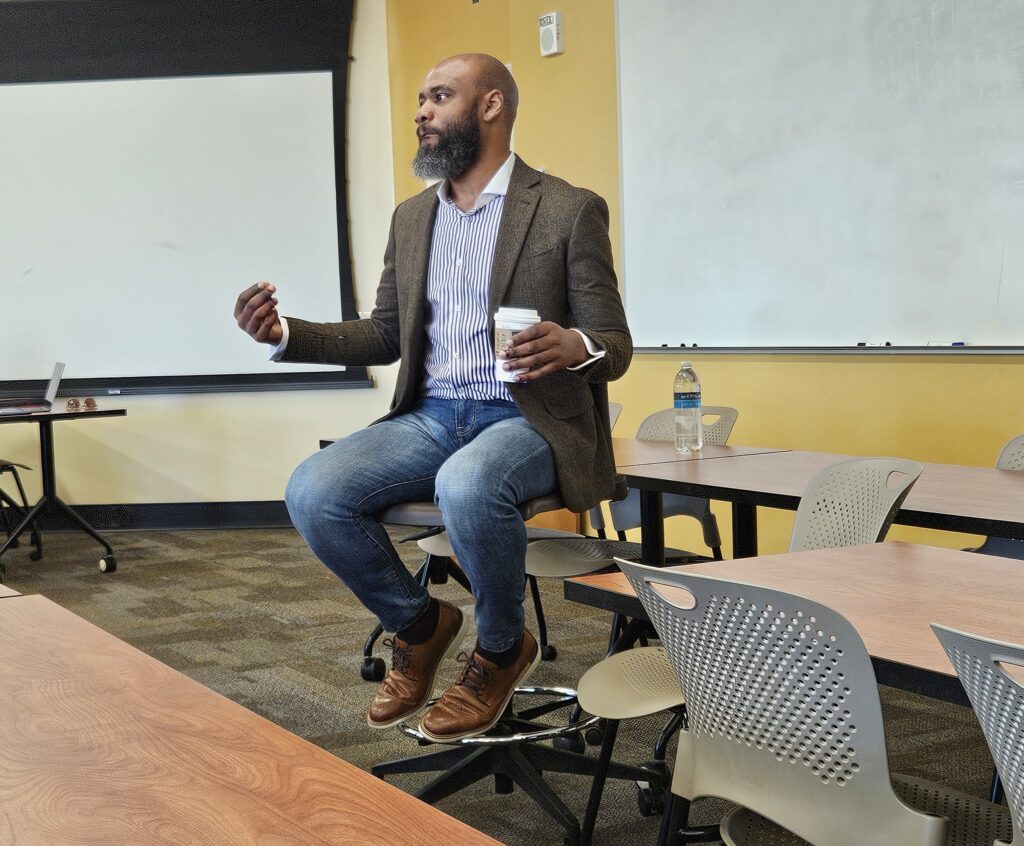On March 11, Terrell Jermaine Starr, an independent journalist based in Kyiv, gave a lecture to Miami University students titled, “Covering the War in Ukraine as a Black Correspondent.”
By Kade Tibberts
March 12, 2024.
Terrell Jermaine Starr is the founder and host of the podcast Black Diplomats and a non-resident Senior Fellow at the Atlantic Council’s Eurasia Center. The lecture was sponsored by the Havighurst Center for Russian & Post-Soviet Studies, in collaboration with the Diane Stark Speaker Series in Journalism. Starr’s lecture focused on his experiences covering the invasion of Ukraine on the ground. He highlighted the importance of his Black identity in regards to his human-centered coverage, as he had a different perspective on colonization and ethnic violence.
Starr firstly highlighted the importance of foreign policy. He emphasized that foreign policy is our opinion on how America should engage with the war, and that everyone should have an opinion on foreign policy. Many Americans consider foreign policy only within the context of military intervention, as economic and diplomatic aid is undervalued in America. Starr forcefully argued that our responsibility as Americans should lead us to care about the invasion of Ukraine due to our participation in NATO.
Starr explained that Americans need to not only be made aware of the invasion, but consider how our nation should engage in non-militaristic support of Ukraine.
Starr then offered reflections about his Blackness and his experience as a journalist in Ukraine. He explained that many commentators and politicians understand the invasion from a white perspective. That is, they assume that Russia will win because it is a country of power and privilege. However, Starr’s Blackness and understanding of oppression allowed him to see Russia’s colonial goals. He understood the ethnic disparities between Russian and Ukrainians, and how Russians see themselves as superior.
Starr was able to see the resilience and resistance of the Ukrainian people.
While on the ground, Starr’s coverage focused on individual Ukrainians and how the war affected their daily lives. The primary narrative assumed that Russia would win swiftly due to their number of weapons and size of military. Starr wanted to tell a different story about the bravery and strength of Ukrainian national identity. His coverage included videos of shopping markets and malls, interviews on the streets, the distribution of arms to civilians, and more.
Starr’s human-centered, ground-level journalism garnered an international audience. His social media pages blew up, as he gained thousands of followers; he currently has 300,000+ followers on Twitter. He was also invited to talk on CNN and other news, as he was able to give a different perspective as an independent journalist. Most people were interested in how Ukrainians continued to live their lives and maintained a sense of normalcy and identity.
Starr spoke about his journey to becoming a journalist in Ukraine. He studied abroad in Russia briefly; after college, he hoped to join the Peace Corps in Russia, but was randomly assigned to Georgia instead. In Georgia, he was introduced to the ethnic oppression that minorities faced in the Russian Empire and USSR. He explained that Caucasians, despite being literally the true Caucasians in the Caucasus, are considered “Black” (черный) by Russians. Georgians were more open to speaking to him about Russian colonization because they knew that he too understood oppression. He was able to connect with them in a way that a privileged white journalist wouldn’t.
Transformed by his experiences in Georgia, Starr finished his Masters in Russian, Eastern European and Eurasian Studies, and continued his studies in language and culture throughout Eurasia. He worked for the American newspaper The Root before choosing to open a tourist business abroad. It was by chance that he moved to Kyiv, Ukraine months before the war. In place of his business, he covered the war, taking videos using just his iphone and a selfie-stick.
At the close of the lecture, Starr asked the audience to be critical of the media they consume. Journalists have a right to free speech, but that means that they have the right to lie, mislead, or unintentionally speak from their own biases. He hoped that his coverage could inform people of the truth, and provide a new narrative on Ukrainian resistance against an oppressive colonial power. But it is the audience’s responsibility to take that knowledge and create an informed opinion on foreign policy. As Starr’s lecture made clear, Americans have the right to choose how our country engages in the world and how we use our resources to protect other human beings.
Kade Tibberts is a senior majoring in Russian, East European, and Eurasian Studies

